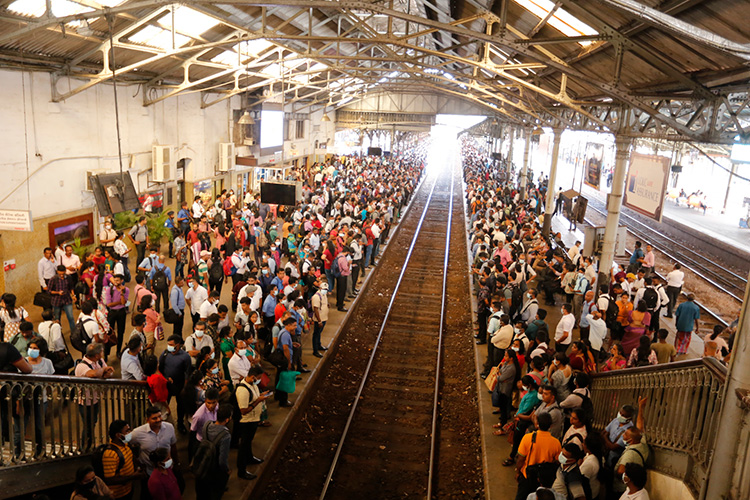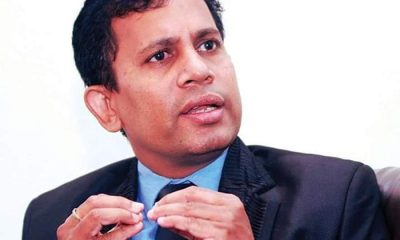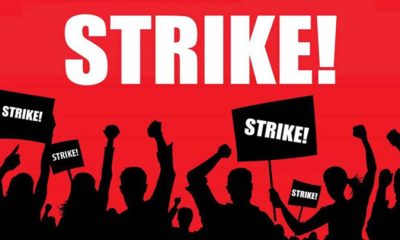News
Strike ends, but unions vow to intensify action to win their demands

Many trade unions staged a one-day general strike yesterday, demanding that taxes, tariffs and interest rates be reduced. The organisers of the strike said they would intensify their trade union action unless the government heeded their demands.
More than 40 trade unions, in several sectors, joined the strike, organised by the trade unions of professionals. Many other state and semi-state trade unions also supported the strike.
The Trade Unions Collective, which organised yesterday’s strike, said it had been compelled to resort to strike action as there was no favourable response from the government to its demands.
Due to the strike, services such as health, posts, and railways were affected. Workers in other sectors ,including education, port, power, water supply, petroleum, road development, and banking services, also joined the strike.
Private bus operators and several trade unions announced that they would not join the strike.
Members of the Government Medical Officers’ Association (GMOA) joined the nationwide strike that started from 8 am yesterday but the Government Medical Officers’ Forum said its members would not join the strike.
Nearly 40,000 nurses also participated in yesterday’s strike.
The Joint Force of Paramedic Professionals said that the strike would become a continuous struggle if the police and the army were deployed crush the strike.
General Secretary of the Ceylon Teachers Service Association Mahinda Jayasinghe said that teachers and principals unions had struck work yesterday.
The non-academic staff of the universities are on strike today in support of the ongoing strike of the Federation of University Teachers’ Association.
General Secretary of the Port Union Progressive Employees’ Union Shyamal Sumanaratne said that all trade unions of the Sri Lanka Ports Authority had struck work yesterday.
All trade unions of the Ceylon Electricity Board reported sick yesterday. Only power plants and essential services continued to operate as normal, General Secretary of the Ceylon Electricity Workers’ Union Ranjan Jayalal said.
President of the Sri Lanka Air Traffic Controllers Association Thisara Amarananda said that air traffic controllers carried out a work-to-rule protest from 12.00 noon to 02.00 pm in support of the strike.
The Professionals Trade Union Collective announced that they would call off their strike action at 8 am today (16).
The banking sector saw the Ceylon Bank Employee Union (CBEU) and the Central Bank’s Trade Union Alliance are on strike. However, the President’s Media Division said several hundred branches of the Bank of Ceylon and the People’s Bank were operational.
News
Maduru Oya helicopter crash: Army, Air Force launch probes

Bell 212 accident during passing out parade kills six military personnel, injures six others
A Bell 212 helicopter, belonging to the Sri Lanka Air Force (SLAF), crashed into the Maduru Oya reservoir yesterday morning, killing six forces personnel and injuring six others. The helicopter was on a routine mission in support of a Special Forces passing-out parade when it encountered technical difficulties and attempted an emergency landing.
The crash occurred at approximately 8:17 a.m., after the helicopter took off from the SLAF Base Hingurakgoda, at 6:47 a.m., and picked up Army personnel in Maduru Oya around 7:08 a.m. According to the SLAF, the aircraft was conducting a heli-rappelling drill as part of a military demonstration when it suffered a technical malfunction shortly after takeoff.
The aircraft was carrying 12 individuals—six from the Army and six from the Air Force, including two pilots. Initial rescue efforts led to all passengers being retrieved alive and transported to the Aralaganwila Regional Hospital, with eight later transferred to the Polonnaruwa General Hospital due to the severity of their injuries.
Despite emergency medical care, six of the personnel succumbed to their injuries—four Army Special Forces soldiers and two Air Force members. Among the deceased were helicopter gunmen and elite Special Forces troops.
In the wake of the tragedy, both the Army and Air Force have launched separate investigations to determine the cause of the crash. Air Force Commander Air Marshal Bandu Edirisinghe has appointed a nine-member inquiry committee, while Army Commander Lieutenant General Lasantha Rodrigo confirmed that expert teams have been dispatched to the crash site to gather evidence.
Air Force spokesperson Group Captain Eranda Geeganage said the crash occurred during a drill demonstration at the training school and that the exact cause of the accident remains unknown at this time.The remaining six injured personnel are still receiving treatment, with their conditions being closely monitored.
By Norman Palihawadane
News
Cardinal Prevost becomes Pope Leo XIV

Nearly half a century has passed since the Catholic Church last had an Italian Pope. In the hallowed corridors of the Vatican, as the Conclave began deliberations to elect a successor to Pope Francis, several Italian names were whispered with increasing frequency. Chief among them was Cardinal Pietro Parolin, the Vatican’s Secretary of State, a seasoned diplomat, and well-known among the electors. Others, like Cardinals Pierbattista Pizzaballa and Matteo Zuppi, also had their share of admirers.
Yet, when the white smoke rose above the Sistine Chapel, it was not an Italian who emerged. Instead, the Cardinals turned to an unheralded American – Robert Francis Prevost, a canon law professor and lifelong missionary – electing him as successor to St. Peter. He has taken the name Pope Leo XIV.
Though born in the United States, Pope Leo’s spiritual and pastoral heart lies in Peru, where he spent much of his life in missionary service. His elevation comes as a surprise to many as he had been made a Cardinal just two years earlier, appointed by Pope Francis himself. A relative newcomer in the College of Cardinals, he was seen by many as a wildcard – yet perhaps that’s exactly what the Church needed.
At 69, Pope Leo is poised for what could be a lengthy pontificate – time enough, perhaps, to carry forward the reforms initiated by his predecessor. It’s no secret that Pope Francis saw in him a leader fit for the challenges of global Catholicism. When Prevost returned from Peru to head the Augustinian Order – a role he held for 12 years – it was Francis who sent him back across continents, appointing him Bishop of Chiclayo and entrusting him with pastoral care once more in Peru.
Those close to the new Pontiff describe him as deeply spiritual, a steady hand, and a bridge-builder, qualities sorely needed in a Church increasingly split between traditionalists and reformists. He is expected to offer a more measured, balanced approach on key issues, fostering dialogue rather than division.
In many ways, this Conclave echoed the dramatic scenes of October 1978, when an unknown outsider from Poland – Karol Wojtyla – was chosen as Pope John Paul II. Like then, the Cardinals have once again looked beyond the obvious front-runners. But, unlike 1978, when it took eight ballots to break the deadlock and settle on a compromise, this time it took just four.
That speed speaks volumes. The Cardinals were not merely settling – they were convinced that here’s the man to take the Church forward. In Cardinal Prevost, they found a shepherd capable of steering the Church through a time of transition, someone who could temper Franciscan reform with pastoral wisdom and unite a divided flock under the banner of faith and humility.
By Rex Clementine
News
Appeals Court nullify appointment of RDA Director General

The Court of Appeal on Thursday issued a writ order nullifying the appointment of S.M.P. Suriyabandara as the Director General of the Road Development Authority (RDA), citing a breach of proper procedure. The Court found that the selection process was in violation of established appointment guidelines.
The Court directed the RDA and the Minister of Transport and Highways to appoint K.W. Kandambi to the post, with effect from 5th March 2024. Kandambi, a civil engineer with 23 years of service at the RDA, had outperformed Suriyabandara in the official interview process, scoring 61 marks compared to Suriyabandara’s lower score.
President’s Counsel Faizer Mustapha, representing Kandambi, argued that appointing a candidate with fewer marks was unlawful and requested the Court to invalidate the appointment.
Acting President of the Court of Appeal, Mohamed Lafar Tahir, ruled that the respondents had violated the law in their selection process, thus issuing the writ order to correct the appointment.
By A.J.A. Abeynayake
-

 Opinion6 days ago
Opinion6 days agoRemembering Dr. Samuel Mathew: A Heart that Healed Countless Lives
-

 Business4 days ago
Business4 days agoAitken Spence Travels continues its leadership as the only Travelife-Certified DMC in Sri Lanka
-

 Latest News3 days ago
Latest News3 days agoNPP win Maharagama Urban Council
-

 Business4 days ago
Business4 days agoLinearSix and InsureMO® expand partnership
-

 Business2 days ago
Business2 days agoJohn Keells Properties and MullenLowe unveil “Minutes Away”
-

 Features6 days ago
Features6 days agoTrump’s economic missiles are boomeranging
-

 Latest News6 days ago
Latest News6 days agoThe Heat index is likely to increase up to ‘Caution level’ at some places in Eastern, Northern, North-central and North-western provinces and in Monaragala and Hambantota districts.
-

 Business3 days ago
Business3 days agoNDB Bank partners with Bishop’s College to launch NDB Pixel awareness






















